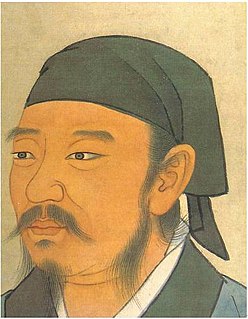A Quote by Thomas Aquinas
All men are equal in nature, and also in original sin. It is in the merits and demerits of their actions that they differ.
Related Quotes
Every person in the world is by nature a slave to sin. The world, by nature, is held in sin's grip. What a shock to our complacency- that everything of us by nature belongs to sin. Our silences belong to sin, our omissions belong to sin, our talents belong to sin, our actions belong to sin. Every facet of our personalities belong to sin; it own us and dominates us. We are its servants.
In The Federalist, James Madison called the rage for equality 'a wicked project.' People differ and rewards differ-that's the essence of both liberty and justice. No nation that rewards effort, talent, inventiveness and luck can even pretend to cherish equal outcomes. In an inventive and dynamic society, equal (even relatively equal) incomes can be achieved only by abandoning liberty for tyranny.
It is remarkable that men, when they differ in what they think considerable, will be apt to differ in almost everything else; their difference begets contradiction; contradiction begets heat; heat quickly rises into resentment, rage, and ill-will; thus they differ in affections, as they differ in judgment.
The process could be likened to relaxing on a riverbank and watching a fish leap out of the water, sparkle for a moment in the sunlight, then dive back in a graceful arc. There is no need to engage in a mental dialogue about the merits and demerits of the fish, emotionally react to the fish, or jump into the water to try to catch the fish. Once the fish is out of sight, it should also be out of mind.
I also came to see that liberalism's superficial optimism concerning human nature caused it to overlook the fact that reason is darkened by sin. The more I thought about human nature the more I saw how our tragic inclination for sin causes us to use our minds to rationalize our actions. Liberalism failed to see that reason by itself is little more than an instrument to justify man's defensive ways of thinking. Reason, devoid of the purifying power of faith, can never free itself from distortions and rationalizations.
Since nature does not endow all men with equal beauty or equal intelligence, and the faculty of volition leads men to make different choices, the egalitarians propose to abolish the "unfairness" of nature and of volition, and to establish universal equality in fact - in defiance of facts. It is not equality before the law that they seek, but inequality: the establishment of an inverted social pyramid, with a new aristocracy on top - the aristocracy of non-value.
Men agree that justice in the abstract is proportion, but they differ in that some think that if they are equal in any respect they are equal absolutely, others that if they are unequal in any respect they should be unequal in all. The only stable principle of government is equality according to proportion, and for every man to enjoy his own.
Every one of our sinful actions has a suicidal power on the faculties that put that action forth. When you sin with the mind, that sin shrivels the rationality. When you sin with the heart or the emotions, that sin shrivels the emotions. When you sin with the will, that sin destroys and dissolves your willpower and your self-control. Sin is the suicidal action of the self against itself. Sin destroys freedom because sin is an enslaving power.






































